CALL TODAY 646-846-1136 | EMAIL
Surgical Experts Dedicated to Improving Lives
At Lenox Hill Minimally Invasive Surgery PLLC, Dr. Valery Dronsky and his staff of medical professionals provide compassionate care with the highest ethical & professional standards. In our state of the art facility, we offer surgical services using only the most cutting edge and current procedures and treatments. We specialize in general surgery, including extensive experience in performing hernia repair surgery. Our expertise is in minimally invasive surgery and robotic surgery. Minimally invasive and robotic surgery often allow patients to experience easier recovery than traditional open surgery. They also allow for more precise and less traumatic surgery. When robotic and minimally invasive surgery is not an option, we are also skilled and experienced in traditional open surgical procedures.
Dr. Dronsky is an experienced and highly skilled surgeon having undergone extensive training in school, residency and fellowships. He practices medicine with ethical behavior, compassion and superb bedside manner. In the operating room he exhibits precision mechanical abilities, analytical thinking and the ability to visualize tissue in three dimensions. These innate and learned skills allow Dr. Dronsky to be one of the most dexterous and skilled professionals in New York City and the Country.
Call us: 646-846-1136
PATIENT TESTIMONIALS
Recent Awards
We are honored and deeply appreciative to have consistently received prestigious awards and recognition year after year, establishing us as one of New York’s foremost hospitals for a wide range of general surgeries, safety measures, specialized procedures, and overall excellence in healthcare. At Lenox Hill Minimally Invasive Surgery, our unwavering commitment lies in delivering exceptional care and unwavering support to our patients, guaranteeing their safety and successful recovery throughout their entire surgical experience.
Hospital Quality Awards
 America’s 50 Best Hospitals Award™ (2023, 2022)
America’s 50 Best Hospitals Award™ (2023, 2022)
Top 1% in the nation for providing the highest clinical quality year over year.

America’s 100 Best Hospitals Award™ (2021)
Top 2% in the nation for consistently delivering clinical quality year over year.

America’s 250 Best Hospitals Award™ (2023, 2022, 2021)
Top 5% in the nation for consistently delivering clinical quality.

Patient Safety Excellence Award™ (2023, 2022)
Top in the nation for providing excellence in patient safety by preventing infections, medical errors, and other preventable complications.
Specialty Clinical Quality Awards

America’s 100 Best Hospitals for Cardiac Care Award™ (2023, 2022, 2021, 2020, 2019)
Superior clinical outcomes in heart bypass surgery, coronary interventional procedures, heart attack treatment, heart failure treatment, and heart valve surgery.

America’s 100 Best Hospitals for Coronary Intervention Award™ (2023, 2022, 2021, 2020, 2019)
Superior clinical outcomes in coronary intervention procedures (angioplasty with stent).

America’s 100 Best Hospitals for Prostate Surgery Award™ (2023, 2022, 2021)
Superior clinical outcomes in prostate removal surgery and transurethral resection of the prostate.
Click to see all of our Healthgrades best doctors awards
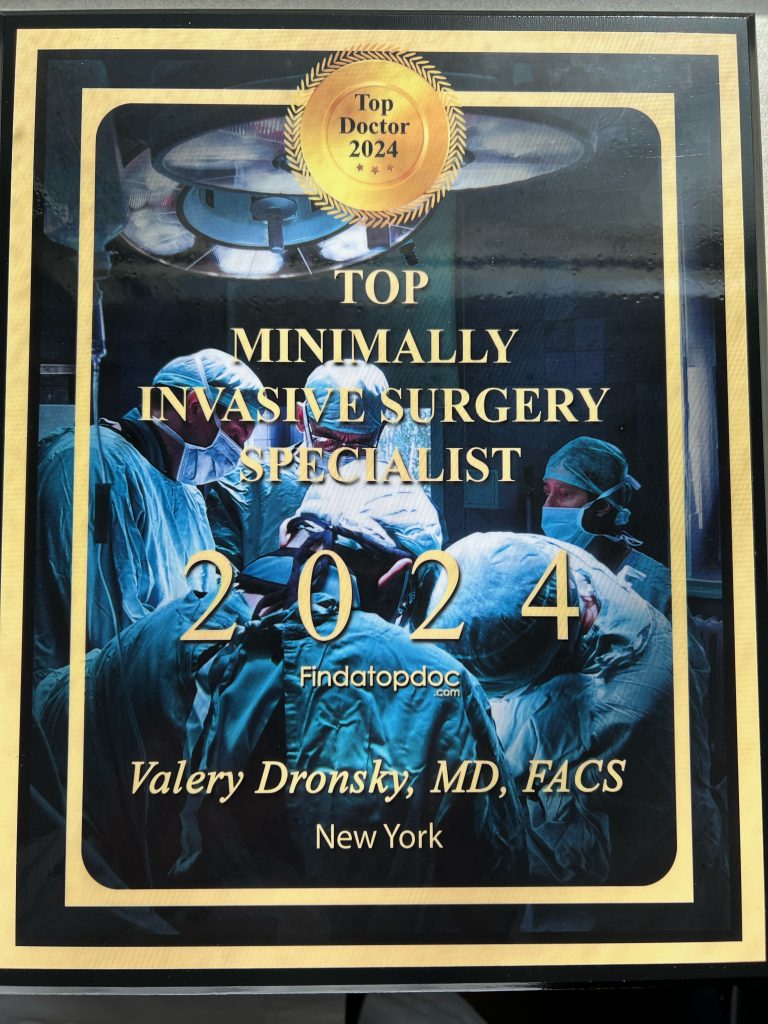
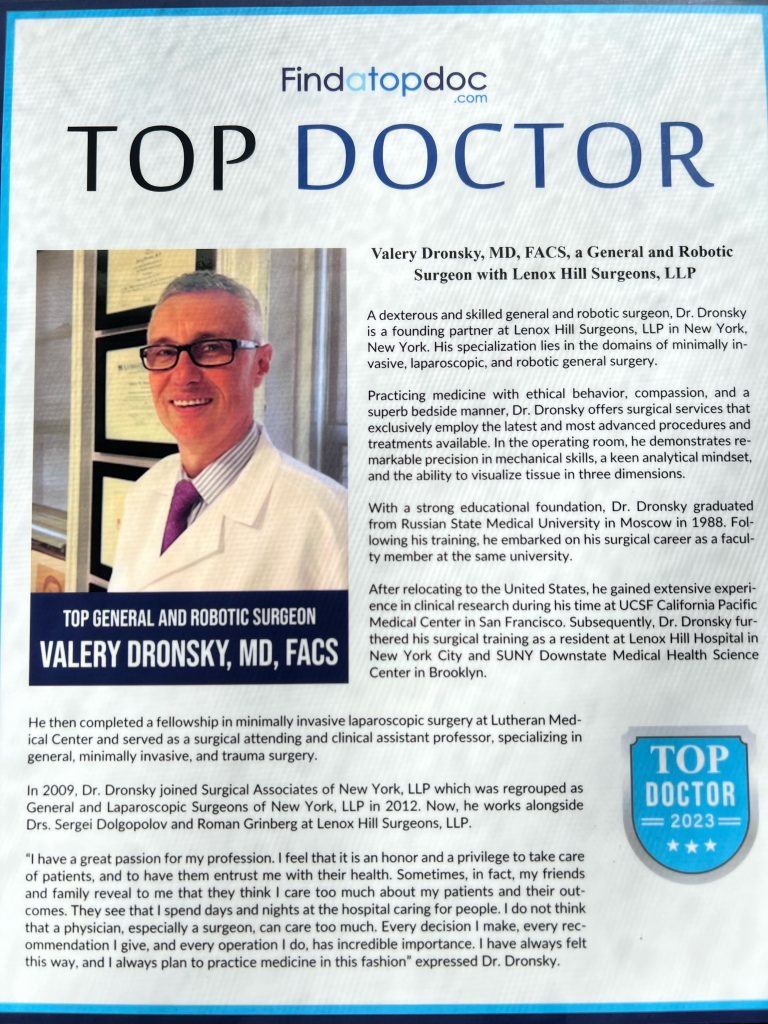


Visit our main website at www.LenoxHillMinimallyInvasiveSurgery.com
Blog Posts are Below:
Category Archives: Gallstone Surgery
Gallstones
Gallstones are not stones. Instead, they are pebble-like solid pieces of digestive fluid that form in the gallbladder. The gallbladder is a small, pear-shaped pouch, found just beneath the liver, on the right side of the abdomen. The small organ stores digestive fluid called bile that flows from the liver to your small intestine.
The salt in the bile helps digest fat easily. It also contains waste products, such as cholesterol and bilirubin. When either of the waste products begins to cluster together as a solid lump, the result is the formation of gallstones. The size of the gallstones may be as large as a golf ball, or as small as a pearl.
Types of Gallstones
Two main types of gallstones that can form in the gallbladder include:
Cholesterol Gallstones
These are the most common types accounting for 80% of gallstones in the US citizens. The cholesterol gallstones are yellowish-green in color. They mainly comprise un-dissolved cholesterol, but may also contain other components.
Pigment Gallstones
Pigment gallstones are smaller and dark brown or black. When there is excessive amount of bilirubin in the bile, it forms pigment gallstones.
Symptoms
Gallstones often cause no signs or symptoms. The patient might not be aware of a gallstone’s existence unless a doctor diagnoses it. Nearly 20% of American adults may have gallstones, yet only around three percent of them develop any symptoms.
The symptoms start to appear when a gallstone lodges into a duct, causing a blockage. Hence, you feel excruciating pain in the upper right part of the abdomen. The pain may last from a few minutes to a few hours, or may come back in episodes, referred to as an “attack.”
You might experience pain in:
- Your right shoulder
- The center of your abdomen, just below the breastbone
- Back pain radiating between your shoulder blades
Or other signs like:
- Nausea or vomiting
- Digestive problems like bloating, heartburn, belching
- Intolerance for greasy food
- Jaundice and weight loss
Causes
Many reasons may cause you to have gallstones, including your weight, genes, diet, and gallbladder issues.
- The human body needs bile, but sometimes the liver excretes more cholesterol than the bile can dissolve. Thus, it may lead to crystal or gallstone formation.
- Bilirubin is another chemical produced during the breakdown of red blood cells. When the liver makes excessive bilirubin, it causes gallstones.
- When your gallbladder does not empty properly, the bile becomes concentrated, thereby forming gallstones.
Risks
Certain factors make people susceptible to gallbladder issues, especially gallstones. The people who are at risk include:
- Women, especially those who are pregnant, using birth control pills, or undergoing hormone replacement therapy
- Obese or overweight people
- People on a crash diet
- Diabetic patients
- Those using cholesterol-lowering drugs
Treatments
Silent gallstones usually don’t require any treatment. For the diagnosis, the doctor may draw a blood sample, recommend an ultrasound, endoscopy, or CT scan. However, if the symptoms appear, the patient may have to get the gallbladder removed through surgery.
Cholecystectomy
Cholecystectomy is a common procedure for gallbladder removal. The surgeon makes incisions in the abdomen and passes the surgical instruments, a light, and a camera for images, through the cuts. The doctor monitors the video and removes the gallbladder safely. After the surgery, the bile flows from your liver to the intestine directly. The patient may go home the same day following the surgery.
In open cholecystectomy, the doctor has to make bigger cuts to remove the gallbladder. Hence, the patient may have to stay in the hospital for a few days.
Medication
If surgery is not the best option for you because of your medical condition, then oral medications may help dissolve the gallstones. The doctor may prescribe Ursodiol (Actigall, Urso 250, Urso Forte), Chenodiol (Chenodol), or both. However, the process may take months or years. Thus, the gallstones may form again if the patient does not take the medication regularly.
Final Thoughts
Removing a gallbladder has no harmful effects on your digestion ability, and you can survive without a gallbladder. Our dedicated team of surgeons at Lenox Hill Minimally Invasive Surgery uses the cutting edge technology and current procedures for a safe removal of the gallbladder. Contact us today if you have any of the symptoms stated above.
LENOX HILL MINIMALLY INVASIVE SURGERY
646-846-1136
admin@lenoxmis.com
Gallbladder and Gallstone Surgery – NYC General Surgeon
Gallstone and Gallbladder Surgery: Steps, Benefits, Side-Effects, Precautions & Prognosis
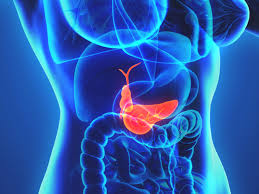 Gallstone and gallbladder surgery referred to as cholecystectomy in medical parlance, is an operative procedure where your gallbladder is removed. Gallbladder surgery is chiefly performed to get rid of gallstones or cholesterol stones which if not removed could lead to severe complications like cholangitis, pancreatitis, and cholecystitis. Gallbladder deletion or excision is the best solution if this biliary-tract organ becomes swollen (cholecystitis) or infected or if you’re diagnosed with biliary dyskinesia (compromised outflow of bile), choledocholithiasis or pancreatitis.
Gallstone and gallbladder surgery referred to as cholecystectomy in medical parlance, is an operative procedure where your gallbladder is removed. Gallbladder surgery is chiefly performed to get rid of gallstones or cholesterol stones which if not removed could lead to severe complications like cholangitis, pancreatitis, and cholecystitis. Gallbladder deletion or excision is the best solution if this biliary-tract organ becomes swollen (cholecystitis) or infected or if you’re diagnosed with biliary dyskinesia (compromised outflow of bile), choledocholithiasis or pancreatitis.
Cholecystectomy is the most popular and preferred treatment mode of doing away with gallstones as these do not resolve or dissolve as a matter of course. You know that you’re due for surgery when you suffer from acute abdominal pain, nausea, vomiting, flatulence, fever or jaundice.
Surgery Types & Methods
In very rare circumstances, gallstones can be melted away or resolved by making dietary changes like reducing consumption of fatty foods or taking certain medications. However, these strategies are, for the most part, ineffective if the stones are sizable. For nearly 80% of individuals with gallstones, surgery is the best and the only alternative.
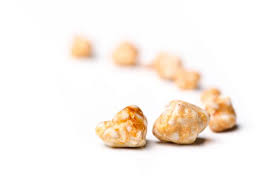
There are primarily three surgical procedures that surgeons carry out for gallstone elimination: cholecystectomy (gallbladder resection), ERCP (endoscopic retrograde cholangiopancreatography), and cholecystostomy (drainage of the bladder).
- Cholecystectomy is the most widely used technique for clearing away cholesterol stones. Two types of gallbladder surgery are in vogue-laparoscopy (keyhole surgery) and open surgery. The laparoscopic operation is more popular in comparison to the open surgery mode because of the former’s inherent benefits.
- The open surgical method is resorted to especially when anatomical issues are resulting from previous gastrointestinal surgeries, like the presence of scar tissues. Though it takes roughly 1-2 hours for performing both the types of operation, open surgery entails a longer stay in the hospital and an extended recovery period, largely because of the wider opening.
- In ERCP, an endoscope is inserted into the small intestine via the esophagus for dealing with an obstructed common bile duct. Surgical tools are slotted in together with the endoscope for correcting the constricted or blocked sections of CBD once the gallbladder is excised. Often, it may not be possible to conduct surgery on some patients.
In these circumstances, the excess bile is drained away from the bladder with the help of a catheter. Nevertheless, these patients will have to consider surgery in the long run.
Benefits
Opting for a laparoscopic or open gallbladder surgery has its benefits. Removing a diseased or contaminated bladder ensures that you’ll be able to get back to leading a normal life quickly. Choosing laparoscopic intervention ascertains that your hospital stay will be shorter-you may be discharged on the very day the operation is performed. Also, the recuperation will be faster compared to open surgery.
The chances of the complications returning or recurring are also very slim once the surgery is done.
Side Effects
- Bleeding
- A hernia
- Blood clots
- Heart attack or stroke
- Wound infection
- Abdominal swelling
- Allergic reactions from general anesthesia
- Bile leakage
- Pneumonia
- The possibility of damage to organs surrounding the gallbladder
Precautions
- Cleanse and dress the incision area periodically
- Walk as much as you can to prevent thrombosis
- Wear loose fitting clothes so that the incision is not abraded against
- Follow the dietary chart prescribed by the surgeon
- Take all medications on time and complete the course
Prognosis
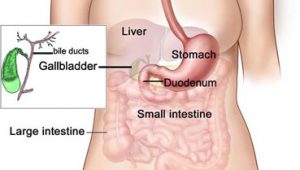 As far as the short-term prognosis is concerned, the success rate of bladder operations is excellent. The kind of surgery you go for determines the recuperation period. You’ll experience mild postoperative pain if laparoscopy is involved. Talking about the long-term scenario, you’re less likely to suffer from the complications you had before the surgery.
As far as the short-term prognosis is concerned, the success rate of bladder operations is excellent. The kind of surgery you go for determines the recuperation period. You’ll experience mild postoperative pain if laparoscopy is involved. Talking about the long-term scenario, you’re less likely to suffer from the complications you had before the surgery.
Concluding Remarks
Laparoscopic or open surgery is the feasible option for getting relief from complications or issues related to the gallbladder. For more details about this treatment option and to evaluate if this is the right stage to get this treatment, we advise you to fix an appointment with one of our specialists for consultation.
References
- https://www.hon.ch/HONselect/Selection/E04.html
- https://www.healthline.com/health/gallbladder-removal-open#outlook
- https://www.healthline.com/health/gallbladder-removal-laparoscopic#follow–up
- https://www.uofmhealth.org/health-library/hw106860
- https://www.webmd.com/digestive-disorders/surgery-for-gallstones#1
- https://www.sages.org/publications/patient-information/patient-information-for-laparoscopic-gallbladder-removal-cholecystectomy-from-sages/
- https://www.everydayhealth.com/gallbladder/surgery-what-expect/















